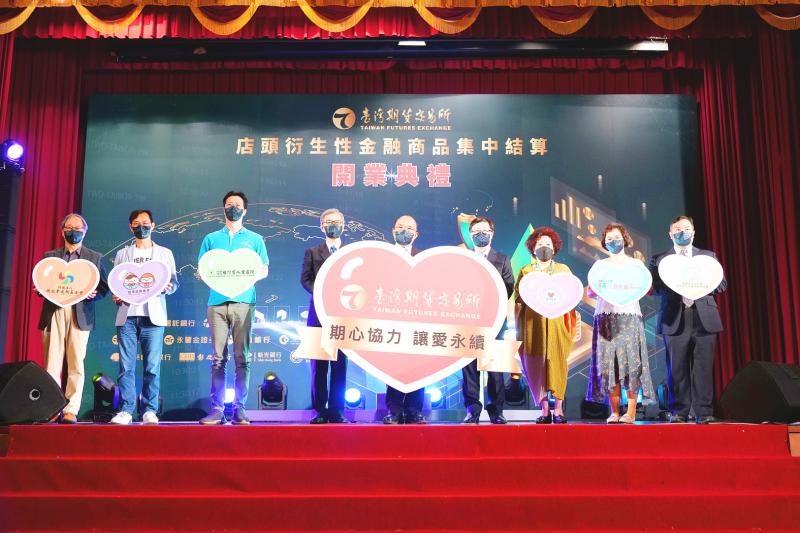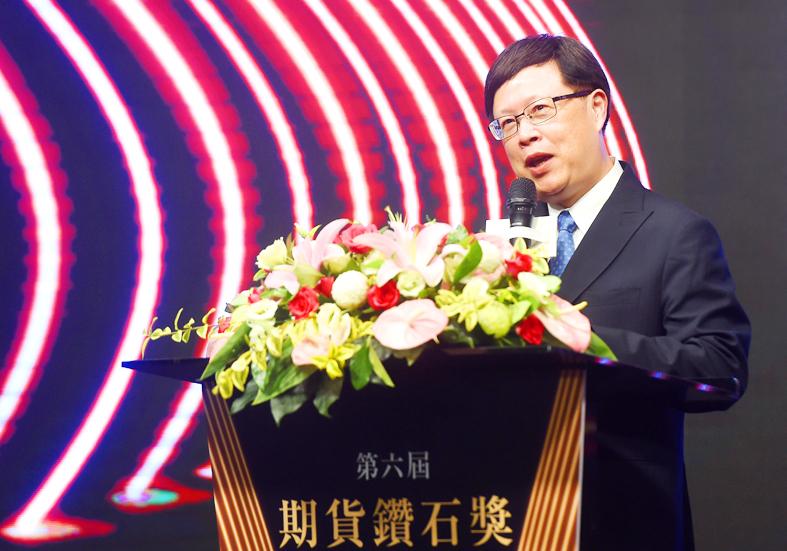Eleven domestic financial institutions have registered as members of a new over-the-counter (OTC) derivatives clearing business that the Taiwan Futures Exchange (TAIFEX) launched on Monday last week to bolster the resilience of the financial system and align with international supervision trends, the exchange said.
The 11 financial institutions are CTBC Bank (中信銀行), Yuanta Commercial Bank (元大銀行), Taipei Fubon Commercial Bank (台北富邦銀行), Bank SinoPac (永豐銀行), SinoPac Securities Co (永豐金證券), E.Sun Commercial Bank (玉山銀行), Taiwan Cooperative Bank (合庫銀行), Cathay United Bank (國泰世華銀行), Chang Hwa Commercial Bank (彰化銀行), Shin Kong Commercial Bank (新光銀行) and Bank of Taiwan (臺灣銀行), the exchange said.
Over-the-counter transactions are deals that take place outside the exchange. Usually, the transactions are negotiated between financial institutions, or conducted by brokers as an intermediary between buyers and sellers. Brokers usually ask potential buyers or sellers their acceptable prices and trading conditions by telephone or the Internet and seek to facilitate the deals, with buyers and sellers bearing the credit and default risks themselves.

Photo courtesy of Taiwan Futures Exchange
However, OTC derivatives transactions are complex and provide high financial leverage. For buyers and sellers, when one party defaults, it might trigger a domino effect and affect the stability of the financial market, the exchange said, citing the 2008 global financial crisis as an example that was caused by investments in complex derivatives by international financial institutions and eventually created systemic risks for global financial markets.
By establishing central clearing mechanisms for OTC derivatives, the risk of trading defaults can be transferred to the TAIFEX, and the original creditor-debtor relationship between buyers and sellers would become the relationship between the exchange and the buyers or sellers, it said.
In so doing, traders no longer need to face various counterparties with different risks, but only need to face the TAIFEX, which can simplify risk management operations and reduce costs.

Photo: Chien Jung-feng, Taipei Times
Moreover, the risks of each participant’s long and short positions in multiple transactions would offset each other, leaving only a single net position with the TAIFEX, which can reduce the total exposure of credit risks, it added.
The TAIFEX said it evaluates the value of each contract based on the market price every day, and its central clearing mechanism can handle profit-and-loss payments and implement risk management.
As a result, the risk status of each participant can be grasped in real time and alerted in advance, it said.
Even if a party defaults, the exchange’s financial defense pool can absorb the shock, and prevent the risk from continuing to expand and trigger a financial crisis, it added.
According to the regulations of the Financial Supervisory Commission, only 2 percent of the risk weight is required for financial institutions when calculating the accrued capital for the counterparty credit risk after conducting TAIFEX clearing.
Therefore, it can effectively reduce financial institutions’ capital accrual while improving their efficiency of fund utilization, the exchange said.
Moreover, in the past, domestic financial institutions usually conducted central clearing through foreign settlement institutions such as the London Clearing House, and the fees were very high, it said.
The exchange’s OTC central clearing mechanism hence allows transactions to be handled domestically, which provides financial institutions more convenience along with lower operating costs, it added.
The clearing mechanism is the central nervous system of a nation’s financial market. To ensure control over the core technologies behind Taiwan’s financial market, the TAIFEX independently developed the clearing system by integrating 15 modules rather than purchasing one, it said.
Only by ensuring smooth clearing and settlement can Taiwan build confidence in trading and allow the market to flourish, the TAIFEX said, adding that the OTC central clearing mechanism would ensure the safety of people’s transactions and reduce the financial industry’s operating costs, as well as create a favorable trading and hedging environment in the nation.
Overall, the establishment of the new OTC central clearing mechanism is expected to provide more convenience for market participants, boost the resilience of the financial system, attract foreign capital to the local market and enhance Taiwan’s international visibility, the exchange said.
The TAIFEX has been seeking accreditation as a qualified central counterparty in the US, the EU, the UK and Canada to attract foreign capital and enhance the domestic market’s international competitiveness, it said.
In addition to the launch of the new OTC derivatives clearing business on Monday, TAIFEX also organized charity activities on the same day to fulfill its corporate social responsibility. Witnessed by Premier Su Tseng-chang (蘇貞昌) and Financial Supervisory Commission Chairman Thomas Huang (黃天牧), TAIFEX chairman Wu Tzu-hsin (吳自心) made donations totaling NT$3 million (US$100,207) on behalf of the exchange to six organizations in an effort to help disadvantaged groups such as the physically and mentally handicapped, older people with dementia, single-parent families and people with rare diseases.
The TAIFEX also hopes to shrink the gap between urban and rural areas, extend its attention to art and cultural organizations in remote areas, and encourage more enterprises to jointly build a more inclusive society and achieve sustainable development.

MULTIFACETED: A task force has analyzed possible scenarios and created responses to assist domestic industries in dealing with US tariffs, the economics minister said The Executive Yuan is tomorrow to announce countermeasures to US President Donald Trump’s planned reciprocal tariffs, although the details of the plan would not be made public until Monday next week, Minister of Economic Affairs J.W. Kuo (郭智輝) said yesterday. The Cabinet established an economic and trade task force in November last year to deal with US trade and tariff related issues, Kuo told reporters outside the legislature in Taipei. The task force has been analyzing and evaluating all kinds of scenarios to identify suitable responses and determine how best to assist domestic industries in managing the effects of Trump’s tariffs, he

TIGHT-LIPPED: UMC said it had no merger plans at the moment, after Nikkei Asia reported that the firm and GlobalFoundries were considering restarting merger talks United Microelectronics Corp (UMC, 聯電), the world’s No. 4 contract chipmaker, yesterday launched a new US$5 billion 12-inch chip factory in Singapore as part of its latest effort to diversify its manufacturing footprint amid growing geopolitical risks. The new factory, adjacent to UMC’s existing Singapore fab in the Pasir Res Wafer Fab Park, is scheduled to enter volume production next year, utilizing mature 22-nanometer and 28-nanometer process technologies, UMC said in a statement. The company plans to invest US$5 billion during the first phase of the new fab, which would have an installed capacity of 30,000 12-inch wafers per month, it said. The

Taiwan’s official purchasing managers’ index (PMI) last month rose 0.2 percentage points to 54.2, in a second consecutive month of expansion, thanks to front-loading demand intended to avoid potential US tariff hikes, the Chung-Hua Institution for Economic Research (CIER, 中華經濟研究院) said yesterday. While short-term demand appeared robust, uncertainties rose due to US President Donald Trump’s unpredictable trade policy, CIER president Lien Hsien-ming (連賢明) told a news conference in Taipei. Taiwan’s economy this year would be characterized by high-level fluctuations and the volatility would be wilder than most expect, Lien said Demand for electronics, particularly semiconductors, continues to benefit from US technology giants’ effort

‘SWASTICAR’: Tesla CEO Elon Musk’s close association with Donald Trump has prompted opponents to brand him a ‘Nazi’ and resulted in a dramatic drop in sales Demonstrators descended on Tesla Inc dealerships across the US, and in Europe and Canada on Saturday to protest company chief Elon Musk, who has amassed extraordinary power as a top adviser to US President Donald Trump. Waving signs with messages such as “Musk is stealing our money” and “Reclaim our country,” the protests largely took place peacefully following fiery episodes of vandalism on Tesla vehicles, dealerships and other facilities in recent weeks that US officials have denounced as terrorism. Hundreds rallied on Saturday outside the Tesla dealership in Manhattan. Some blasted Musk, the world’s richest man, while others demanded the shuttering of his